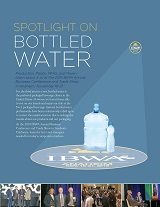When opponents of bottled water such as Seattle Mayor Greg Nickels attempt to stop its consumption, where does it end? The question is asked by Knute Berger at Crosscut.com in Seattle, who appears to be one of many local residents fed up with the crackdowns in the city, home of Starbucks and a large chunk of Boeing:
The city has tried to control what types of alcohol can be sold where, it’s cracked down on loud music, smoking, it wants to start charging you for using the “wrong” type of grocery bags, it wants to eliminate fast food from the city, it has employees inspecting your garbage to see if you’re obeying recycling laws, and our elected leaders are just chomping at the bit to start tracking where you drive and when so they can charge you by the mile. Big Nanny is watching.
As Berger puts it: if drinking bottled water is bad, how can Nickels feel OK about “exporting Boeing aircraft and war machines”?
Which do you think has a bigger impact on greenhouse gases? Which uses more oil?
And lest we forget the one thing most Americans can’t live without: Starbucks.
How much carbon is burned and how much greenhouse gas emitted getting those beans here?
The truth here is, like it or not, the creation of anything bought by a consumer is going to burn some greenhouse gases or make its own negative impact on the environment: planes, coffee, bottled water. But responsible companies like Boeing, Starbucks and a host businesses in the bottled water industry are doing their best to mitigate those impacts with eco-friendly production and obeying federal regulations. So when naysayers such as Mayor Nickels begin picking and choosing what we can and cannot buy or consume, the questions put forth by Crosscut make sense: When does it end?



























